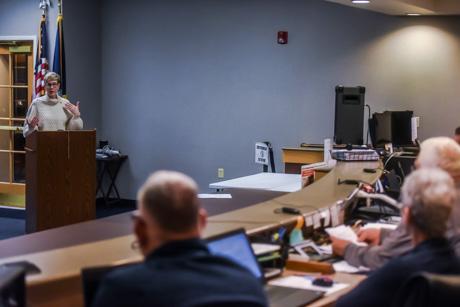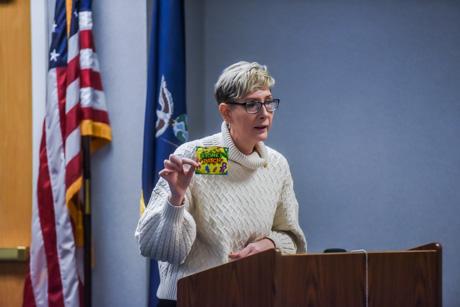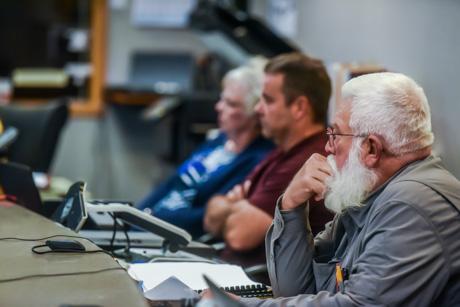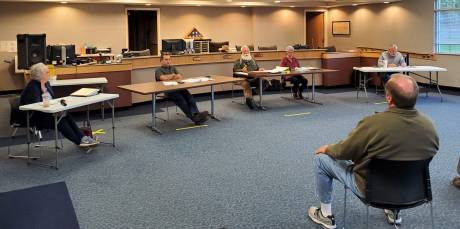Batavia Town Supervisor Gregory Post this afternoon left the door open for a downward adjustment of a proposed $2 million tax levy in 2021, a dollar amount that would nearly double the property tax rate charged to homeowners in the municipality.
Speaking at a special meeting at the Town Hall to release the tentative budget, Post summed up an impassioned, 50-minute response to town resident Michael Shultz, who questioned such a large tax increase, by emphasizing that “this is a starting point.”
“In three weeks, it probably will be a different budget as we have more information to get,” Post said, referring primarily to a third quarter revenue distribution from Genesee County and a report on town spending for the same period.
“Whatever we can do, we’d be willing to reduce the tax rate without endangering our ability to respond to the next disaster (the COVID-19 pandemic and its effects on the New York State economy),” he added.
Councilwoman Patti Michalak quickly finished Post’s statement by saying, “because next year could be worse.”
Town board members – as is the case in municipal governments across the state -- are facing unprecedented tension as they attempt to balance a spending plan of $4,075,787 in the general fund and $1,033,723 in the highway fund.
General Budget Breakdown
Post’s tentative general budget for the 2021 fiscal year, which begins on Jan. 1, calls for $2 million to be raised by property taxes, while using $135,899 from the town’s unexpended fund balance. Revenue is estimated at $1,939,888.
The general budget is more than $1 million less than the 2020 budget and, not coincidentally, the town is currently experiencing a $1 million shortfall in revenue due to cuts in state aid and in sales tax and other revenue from Genesee County.
In 2020, the town board allocated $992,310 from the unexpended fund balance to balance the budget. Measures put into place to reduce the tentative tax rate for 2021 could include using more than the $135,899 currently being proposed.
Should the tentative financial plan remain as is through the budget process, the property tax rate reportedly would jump from $2.45 per $1,000 of assessed valuation to $4.61 per $1,000 of assessed valuation. On a home assessed at $80,000, for example, the tax bill would go from $196 to $368.80.
Shultz, a longtime resident of the Town of Batavia and one of four people in attendance, said when he read about a potential 89-percent increase (actually 88 percent) he was “taken aback.”
“Greg, I read your various news releases this summer and I was fully prepared for some bad news as probably my neighbors were as well,” Shultz said. “And, I expected maybe 25, 30, worst case scenario 35 percent.
Resident Said He Was Shocked
“I was totally taken aback this morning after the disastrous debate last night to read ... and (to) see a probable or potential 89-percent increase was a really shock. I’m quite frankly surprised that more of our neighbors aren’t here.”
After Post replied, “I’m sure they’ll show up eventually,” Shultz continued on, admitting that he had “very limited knowledge of how the municipal budget is established.”
“I worked for 59 years in the private sector (with a background in forest products and gypsum mining and manufacturing),” he said. “Many of those years as a plant manager at a number of facilities across the United States and Canada, and when we got into hard times like this, we got a memo – a very simple one-page memo from the corporate office -- and it said, ‘Here’s your bottom line. You do whatever you gotta do to fill it in.’ ”
Shultz surmised that putting together a budget for a town of the size of Batavia – which continues to expand its wealth through economic development and investment – has “boundaries that are much different than that.”
The resident took the approach that he didn’t understand the process, wanted to learn and “if I can, in some way, participate and help.”
He then thanked Post for his efforts.
“I don’t think you’re going to see a lot of people wanting your job. They’re not going to be running for office, so you can be comfortable with that,” he said.
Many Factors to Consider
Post said he appreciated Shultz’s “perspective,” before embarking on a monologue that touched upon topics such as: how sales tax is distributed to the City of Batavia and towns and villages in Genesee County; how state mandates make things “mindbogglingly difficult” for counties; the town’s history of zero or very low tax rates; lack of revenue from court proceedings due to the COVID-induced shutdown; town employees who are working two or three jobs; and the board’s ability thus far to cut $1.4 million in spending compared to the 2020 budget.
The supervisor said the days of relying on Genesee County’s revenue distribution likely are over.
“We have been so reliant on sales tax revenue for two or three generations .. for as long as I can remember," he said. "The biggest chunk of the Town of Batavia’s revenue has not come from property taxes, it has come from sales taxes."
He said for years he would ask, “What is the future of sales tax distribution?”
“And I never got an answer. So, that was the answer,” he said. “They don’t have a crystal ball either, and the county is in the hardest situation because they cannot bust their tax cap without losing several million dollars – maybe tens of millions of dollars in state aid. They’re no different than a school district.”
The town has received a little more than $1 million in revenue distribution from Genesee County in 2020, much less than the $2.31 million that was anticipated. He doesn’t foresee the number coming anywhere close to what was budgeted.
“Where do I get the other million dollars?” he asked. “I don’t have any other place to get it. There is no money tree in the backyard. I can’t expect the federal government or the state government to come through with anything anytime soon. They’ve had six months and they haven’t budged.”
Post said that the town has been a capable steward of its assets, boasting a five-star rating with 90 percent of its cash invested every day and utilizing friendly refinancing terms to save hundreds of thousands of dollars.
He also boasted of the town’s practice of sharing services with other towns in several areas, including assessor services, building inspection and secretarial work, and praised a full-time staff of 25 employees for “working two jobs and many of them three jobs.”
Calling Out New York State
Post, who has been in the public sector for the past 14 years, said he believes the state’s financial policies are on the brink of collapse.
“This is not a failure of the county government or mismanaging, not a failure of the town not looking far enough down the road; it’s a consequence of the failed policies of this state in supporting local communities when the s--- hits the fan.”
After Post concluded his talk -- and before taking a couple more questions about payments in lieu of taxes and whether the town receives traffic ticket revenue (the answer is a portion stays with the town) – Shultz said he appreciated his transparency.
“It was thorough and I’m sure my neighbors and I understand a little better. So, thank you for all you do and let’s carry on,” he said.
The town board will continue working on the budget with an eye on adopting a preliminary spending plan by Oct. 21. A public hearing has been scheduled for Nov. 4.
Photo: The Batavia Town Board conducted a special meeting this afternoon to talk about its 2021 tentative budget. Town resident Michael Shultz is seated in foreground. Photo by Mike Pettinella.






